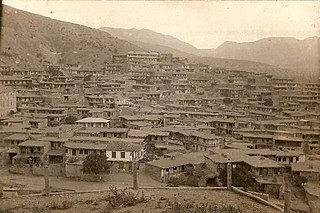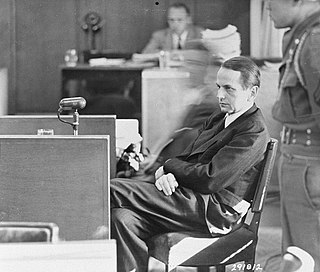Related Research Articles

Ethnic cleansing is the systematic and systemic forced removal of ethnic, racial and/or religious groups from a given territory by a more powerful ethnic group, often with the intent of making a region ethnically homogeneous. The forces which may be applied may be various forms of forced migration, ethnic dilution, intimidation, as well as genocide and genocidal rape.
Mass killing is a concept proposed by genocide scholars to define incidents of non-combat killing by government or state. A mass killing, as defined by Ervin Staub, is "killing members of a group without the intention to eliminate the whole group or killing large numbers of people without a precise definition of group membership."

Population transfer in the Soviet Union was the forced transfer of various groups from the 1930s up to the 1950s ordered by Joseph Stalin. It may be classified into the following broad categories: deportations of "anti-Soviet" categories of population, deportations of entire nationalities, labor force transfer, and organized migrations in opposite directions to fill the ethnically cleansed territories. Dekulakization marked the first time that an entire class was deported, whereas the deportation of the Soviet Koreans in 1937 marked the precedent of a specific ethnic deportation of an entire nationality.
Michael Mann FBA is a British-born emeritus professor of sociology at the University of California, Los Angeles (UCLA) and at the University of Cambridge. Mann holds dual British and United States citizenships. He received a B.A. in modern history in 1963 and a D.Phil. in sociology in 1971 from the University of Oxford.

The Greek genocide, including the Pontic genocide, was the systematic killing of the Christian Ottoman Greek population of Anatolia which was carried out during World War I and its aftermath (1914–1922) on the basis of their religion and ethnicity. It was instigated by the government of the Ottoman Empire and the Turkish national movement against the indigenous Greek population of the Empire and included massacres, forced conversion to Islam, forced deportations involving death marches, expulsions, summary execution, and the destruction of Eastern Orthodox cultural, historical, and religious monuments. Several hundred thousand Ottoman Greeks died during this period. Most of the refugees and survivors fled to Greece. Some, especially those in Eastern provinces, took refuge in the neighbouring Russian Empire.
Justin A. McCarthy is an American demographer, professor of history at the University of Louisville, in Louisville, Kentucky. He holds an honorary doctorate from Boğaziçi University, Turkey, and is a board member of the Institute of Turkish Studies and the Center for Eurasian Studies (AVIM). His area of expertise is the history of the late Ottoman Empire.

Behaeddin Shakir or Bahaeddin Shakir was an Ottoman right wing politician and one of the architects of the Armenian Genocide. He was a founding member of the Committee of Union and Progress (CUP), which he transformed into a political party, and director of the Shuraï-Ummett, a newspaper that supported the Committee. During World War I he was part of the leadership of the Teşkilât-ı Mahsusa. At the end of that war he was detained with other members of the CUP, first by a local Ottoman court martial and then by the British government. He was then sent to Malta pending military trials for crimes against humanity, which never materialized, and was subsequently exchanged by Britain for hostages held by Turkish nationalist forces. Şakir reportedly declared that "I am the one who is responsible" for the Armenian deportations and "I absolutely don’t regret my deed".

Sir John Rankine Goody (1919–2015), known as Jack Goody, was an English social anthropologist. He was a prominent lecturer at Cambridge University, and was William Wyse Professor of Social Anthropology from 1973 to 1984.
Rape during the Bosnian War was a policy of systemic violence, which assumed a gender-targeted and mass form. While men from all ethnic groups committed rape, the vast majority of rapes were perpetrated by Bosnian Serb forces of the Army of the Republika Srpska (VRS) and Serb paramilitary units, who used rape as an instrument of terror and key tactics as part of their programme of ethnic cleansing. Estimates of the number of women raped during the war range between 10,000 and 50,000, with the further estimate that for one reported rape there are 15 to 20 unreported cases.
Political cleansing of population is the eliminating categories of people in specific areas for political reasons. The means can vary from forced migration to politicide.
Many mass killings occurred under 20th-century communist regimes. Death estimates vary widely, depending on the definitions of deaths included. The higher estimates of mass killings account for crimes against civilians by governments, including executions, destruction of population through man-made hunger and deaths during forced deportations, imprisonment and through forced labor. Terms used to define these killings include "mass killing", "democide", "politicide", "classicide" and a broad definition of "genocide".
Classicide is a concept proposed by Michael Mann to describe the deliberate and systematic destruction, in whole or in part, of a social class through persecution and violence. Although first used by Fred Schwarz in 1972, classicide was popularized by Mann as a term that is similar but distinct from the term genocide to mean the "intended mass killing of entire social classes." Classicide is considered "premeditated mass killing" and narrower than genocide in that it targets a part of a population defined by its social status but broader than politicide in that the group is targeted without regard to their political activity.
The Young Turks' Crime Against Humanity: The Armenian Genocide and Ethnic Cleansing in the Ottoman Empire is a 2011 book by Taner Akçam, published by Princeton University Press. It discusses the role of the Young Turk movement in the Armenian Genocide and other ethnic removals.
The Armenian Massacres in Ottoman Turkey: A Disputed Genocide is a 2006 book by Guenter Lewy about the Armenian Genocide in the Ottoman Empire. In the book, Lewy argues that the high death toll among Ottoman Armenians was a byproduct of the conditions of the marches and on sporadic attacks rather than a planned attempt to exterminate them.

Genocide justification does not deny the events that took place, but seeks to justify that the genocide was morally excusable or necessary. It is often claimed that the genocide victims presented a serious threat to the perpetrators, meaning that their killing was merely self-defense of a nation or state. According to modern international criminal law, there can be no excuse for genocide.
Eric D. Weitz is Distinguished Professor of History at City University of New York, and author of several books.
Benjamin Andrew Valentino is a political scientist and professor at Dartmouth College. His 2004 book Final Solutions: Mass Killing and Genocide in the 20th Century, adapted from his PhD thesis and published by Cornell University Press, has been reviewed in several academic journals.
Bibliography of the Armenian Genocide is a list of books about the Armenian Genocide:
References
- ↑ Breuilly, John; Cesarani, David; Malesevic, Sinisa; Neuberger, Benyamin; Mann, Michael (2006). "Debate On Michael Mann's The Dark Side of Democracy: Explaining Ethnic Cleansing". Nations and Nationalism. 12 (3): 389–411. doi:10.1111/j.1469-8129.2006.00251.x.
- ↑ Glassheim, Eagle (2006). "The Dark Side of Democracy: Explaining Ethnic Cleansing". Central European History. 39 (3): 519–521. doi:10.1017/S0008938906320171.
- ↑ Torpey, John (2005). "Understanding Ethnic Cleansing: The Dark Side of Democracy: Explaining Ethnic Cleansing by Michael Mann Cambridge University Press, 2004, 590 pages". Contexts. 4 (3): 60–62. doi:10.1525/ctx.2005.4.3.60. S2CID 61720302.
- ↑ Weitz, Eric D. (2005). "The Dark Side of Democracy: Explaining Ethnic Cleansing". The American Historical Review. 110 (4): 1138–1139. doi:10.1086/ahr.110.4.1138.
- ↑ Burke, John Francis (2007). "The Dark Side of Democracy: Michael Mann. The Dark Side of Democracy: Explaining Ethnic Cleansing . New York: Cambridge University Press, 2004". History: Reviews of New Books. 35 (3): 89–91. doi:10.3200/HIST.35.3.89-91. S2CID 142981229.
- ↑ Suzuki, Susumu (November 2005). "Review of Mann, Michael, The Dark Side of Democracy: Explaining Ethnic Cleansing and Mills, Nicolaus; Brunner, Kira, eds., The New Killing Fields: Massacre and the Politics of Intervention". H-Genocide, H-Review. Retrieved 16 January 2021.
- ↑ Magid, Itamar (2010). "Review: The Dark Side of Democracy: Explaining Ethnic Cleansing". Amsterdam Law Forum. 2 (3): 107. doi: 10.37974/ALF.139 .
- ↑ Alvarez, A. (2007). "The Dark Side of Democracy: Explaining Ethnic Cleansing, Michael Mann (New York: Cambridge University Press, 2005), 590 pp., cloth $70.00, 584 pp., pbk. $24.99". Holocaust and Genocide Studies. 21 (1): 156–158. doi:10.1093/hgs/dcm019.
- ↑ Suny, Ronald Grigor (2006). "The Dark Side of Democracy: Explaining Ethnic Cleansing. By Michael Mann (New York, Cambridge University Press, 2005) 590 pp. $70.00". The Journal of Interdisciplinary History. 37 (1): 92–94. doi:10.1162/jinh.2006.37.1.92. S2CID 145149207.
- ↑ Berns-McGown, Rima (2005). "Review: A Century of Genocide, the Dark Side of Democracy". International Journal: Canada's Journal of Global Policy Analysis. 60 (4): 1170–1173. doi:10.1177/002070200506000424. S2CID 149432173.
- ↑ Laitin, David (2006). "Mann's dark side: linking democracy and genocide". An Anatomy of Power: The Social Theory of Michael Mann. Cambridge University Press. pp. 328–340. ISBN 978-0-521-85000-1.